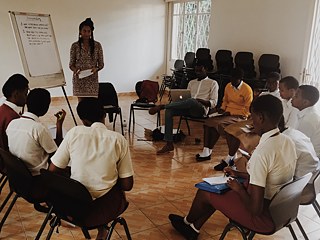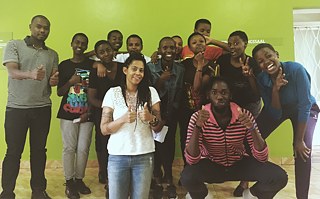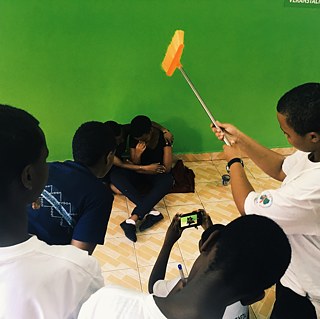Interview
Kantarama Gahigiri

Why did you choose filmmaking as a medium to express yourself?
I always was surrounded by art, but I was searching for the right medium for a long time. Went trough music, theatre, classical studies, a Masters in International Relations… and fortunately I didn't settle! I couldn't be satisfied until that day, when I was for the first time on a film set, helping a friend to do his short film. I remember that moment when it became very clear: cinema has he power to touch people in a way that speaks to me.
After that realization everything was easier, I had a goal. I left and studied for a 2nd Masters in Cinema in New York. I stayed 8 years in total, worked in the industry to get a lot of experience, and started doing my own projects as a director.
What made you come to Rwanda in the first place and why do you keep coming back?
I am Rwandan and I have been coming here since my childhood, it was only natural that at some point I would come here professionally as well.
What is your motivation to teach filmmaking?
It is my way to give back. I hope that I can inspire the young generation and give them some useful advice. Filmmaking is a hard and sometimes solitary business and it is good to connect with likeminded people.
You are holding now a second sequel of ‘Girls in Cinema’. What does it mean for you to teach especially girls in filmmaking?
I am very happy to have had the opportunity to teach a “Girls in Cinema” workshop, and I would like to thank all the partners involved! The students were so talented and progressed very fast. I think it is important to empower young girls and if I can show them that there are opportunities for them and encourage them to pursue their dreams I will.
I wish that at that age I had the same opportunity to discover new careers and different views of the world. Find somebody that could be a mentor/role model. It’s a big responsibility and a lot of work; with my busy schedule I am not always available, but right now I had the time and it felt good to pay it forward.
You were part of this year’s Mashariki Film Festival’s jury. How do you see the Rwandan film scene, as someone who is involved in it, but finds herself also in an external perspective?
I am working very closely with Mashariki African Film Festival since the beginning, as “godmother” of Editions 1 & 2, workshop mentor for 3 years out of the 4, jury member of this edition 2018, and festival ambassador in the future. I do this because I believe in their project and in giving a platform for Rwandan, East African and African films in general.
Let's just shine a light on film in the region for a minute: this year my friend Sam Ishimwe was awarded a Silver Bear at Berlinale for his short film Imfura. It was the first time ever a Rwandan Film participated there. We also had the first Kenyan film selected in Cannes: Rafiki, by Wanuri Kahiu. Friends from the Kenyan collective “The Nest” were co-curating a Pan-African Cinema Today program for Rotterdam International Film Festival. I was curating a panel on Storytelling in Africa at Africa Tech Summit, held in Kigali, Rwanda for the first time. These are only a few examples, but a proof that the art scene is vibrant, and relevant.
I foresee a bright future. There are extremely talented, edgy, creative people in the region. There are so many stories to tell. However, there must be a better system in place in order to support the artists from the beginning, and give them the space to grow. It is necessary, because if you don't want anybody else telling your story and alter your identity you need to support whomever is creating the soul of your own culture.
Is there a narrative that is missing inside the current Rwandan film sector?
As my friends and colleagues here in Kigali recently said, there is definitely a movement, not yet an industry. These past few years have witnessed the emergence of an important “cinema d’auteur” voice, but it is still fragile and needs to be nurtured.
The narrative is there, there just needs to be space for it to grow. It is my wish that my fellow African / Rwandan artists can finally be considered and be respected; that the countries make the conscious effort to support their own artists, also before they are internationally known.
Do you have any tips for upcoming Rwandese filmmakers?
Be proactive.
Do not fear.
And always remember to enjoy the journey; it is not a sprint, it’s a marathon!
What can national and international cultural institutions do to better support the (East-) African film scene?
There needs to be a safe space for projects to grow without interference. There also needs to be professional training in cinema, not only writer/directors skills but also technical skills. There needs to be opportunities to make a living monetary wise if you are a filmmaker. There needs to be access to funds in order to make new films. There needs to be platforms in the region for the projects to be seen and networking to happen. There needs to be financial support for filmmakers to attend major international film festivals and expand their network whenever their film is selected.
What are your plans in the near and far future?
Right now there is this film TANZANITE I really want to make with my friend and colleague Kivu Ruhorahoza. And with that project, I am getting ready to attend Realness Residency for African Screenwriters in June-July, then Durban International Film Festival to pitch the project, then ... maybe Locarno, let's see...
As far as the future goes, for all the reasons mentioned above, I will continue to make films and to tell stories that speak to my heart, and I hope that this will inspire many more on their journey.
Thank you Kantarama!
Further information:
http://circusproductions.tv/about/
http://circusproductions.tv/blog/


